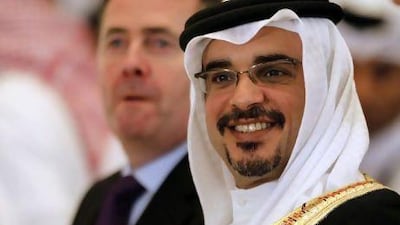MANAMA // Bahrain, which suppressed a wave of pro-democracy protests this year, has promised reforms and said that both sides made mistakes during the events.
Bahrain's crown prince, widely seen as a moderate, said in a statement that he was committed to the reform path and that the kingdom would listen to both domestic and international concerns.
"Undoubtedly, mistakes have been made by all sides during the recent period, but lessons are being learnt," Sheikh Salman bin Hamad al Khalifa said.
"With the end of the [emergency] days … substantial activity is under way to comprehensively address core issues of national and international concern."
Bahrain is eager to show the world that stability has returned after the upheaval in which at least 29 people, all but six of them Shiites, were killed since protests erupted in February.
It plans to lift a state of emergency next week that was imposed when the government quashed the protest movement - mainly by majority Shiites calling for democratic reforms in the Sunni-ruled kingdom.
It now hopes for a return to normality on June 1, after the end of night curfew in Manama this week.
Martial law was imposed in mid-March when the authorities broke up a sit-in of thousands at a traffic roundabout in Manama. Ending the emergency situation two weeks early, the government hopes, will send the right signals to the world.
But democracy activists say that while the ruling al Khalifa family are keen for business to return, they have no intention of easing up on behind-the-scenes repression of the Shiite population.
The government has been accused of carrying out a purge of people who took part in the protests and other Shiites from many companies over the past two months.
Some areas saw protests this week after a military court upheld the death sentence against two people over the killing of two policemen.
A boon for the government would be reinstating Bahrain in this year's Formula One motor racing calendar, after it was forced to postpone its grand prix scheduled for March.
The US president Barack Obama criticised the crackdown in Bahrain, an ally that hosts the US Fifth Fleet and is seen as a bulwark against Iran - during a speech last week, but pressure has been slight.
Mr Obama said Iran, which complained to the United Nations over the crackdown, had tried to take advantage of the turmoil.
The turmoil worsened Bahrain's already tarnished image as a financial hub. Its investment firms have posted steep losses since a regional property bubble burst in 2008, ending their business model of arranging financing for property projects.
Yesterday, Moody's downgraded Bahrain's credit rating and assigned a negative outlook to the Gulf state, citing the continued political tension.
Saudi tourist traffic, which fills Manama's malls and nightclubs at weekends, has been reduced to a trickle.
Politically, the government also wants to show that things are returning to normal. Around 515 people were released from detention this week.
But military trials not only continue, new cases are coming to court, such as that of a 14-year-old boy reported by rights activists on Tuesday.
Nabeel Rajab, a human rights activist, said lifting the emergency "is more a message to the business community and to get back Formula One.
"But inside is totally different to the image presented to the outside world. Things look no different in terms of repression and security measures."
At the same time, there is no indication of any desire within the ruling establishment to take up dialogue with the opposition, which was on the table until the protests were broken up on March 17.
Three Shiite groups said in early March that they wanted to topple the monarchy and transform Bahrain into a republic. But Wefaq, the biggest opposition group, which sought an elected government and end to discrimination in jobs and housing against Shiites, appeared to vacillate on talks.
The government last month raised legal action against Wefaq on charges of seeking to "overthrow the constitutional order" and taking instructions from Shiite clerics.
One opposition figure, who did not wish to be named for fear of arrest, said hardliners within the ruling family want to bypass Wefaq and encourage the formation of a new opposition.
"Bahrain's political scene has fundamentally changed," he said. "The government wants to sell a story to the West that all is back to normal, but on the ground, abuses will continue to silence dissent."
Officials have said Saudi and UAE forces will remain in the country indefinitely and the foreign minister, Sheikh Khalid al Khalifa, raised the prospect last week of a permanent Gulf Cooperation Council military presence in Bahrain.

